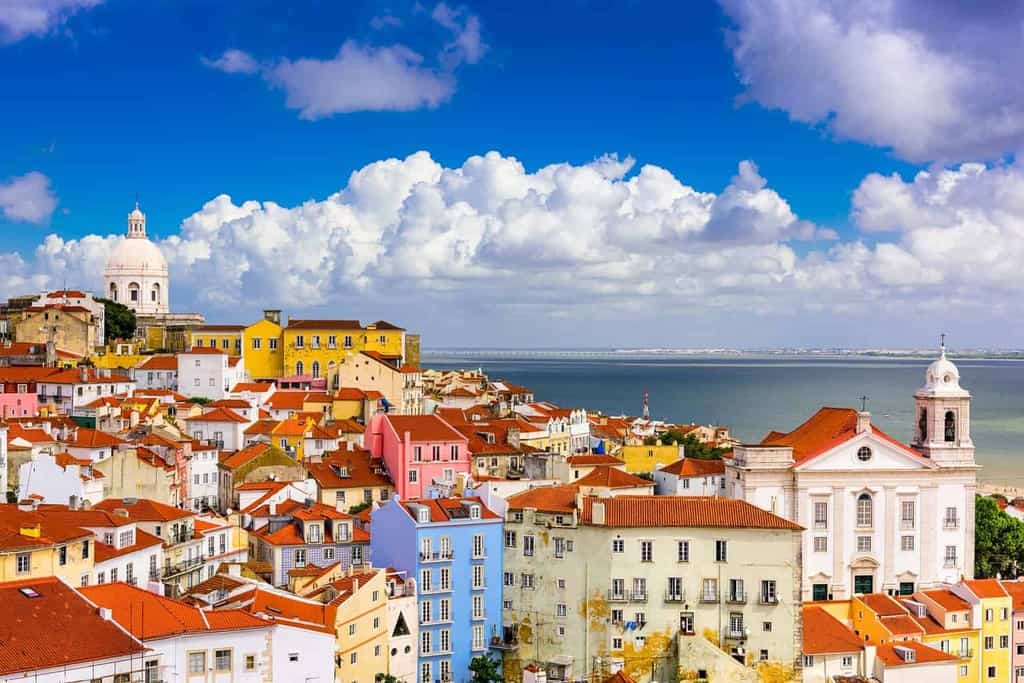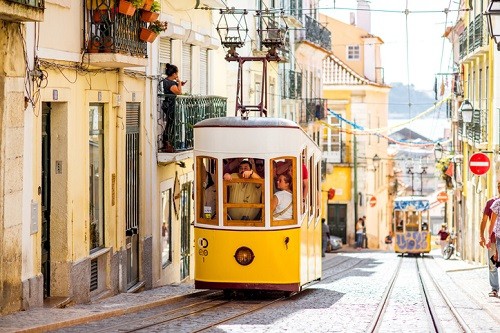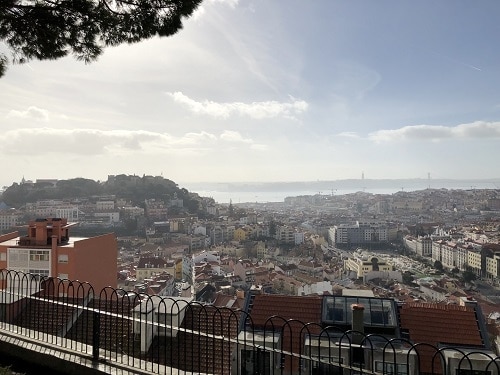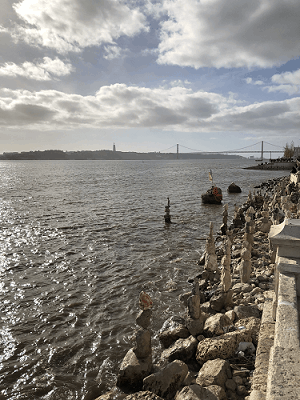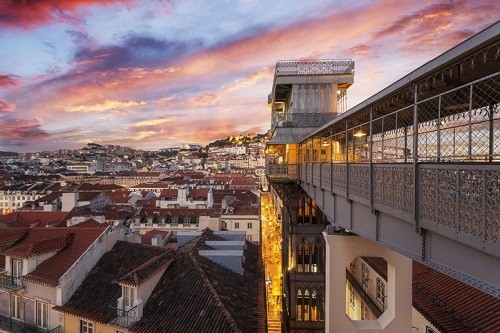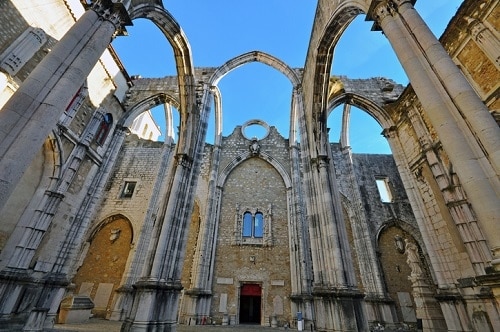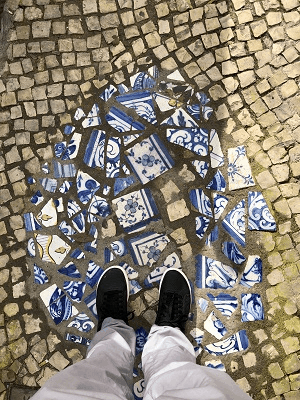Learn about the best things to do in and near the city of Lisbon in Portugal during 2024. Discover what Lisbon is famous for in addition to unique things to do. From candlelit dinner fado performances, to the best neighborhoods, viewpoints, wineries, wine tasting excursions and delightful day trips to the countryside and palaces nearby.
A city that truly has it all, Lisbon blends a rich historical past with a contemporary food scene, pristine beaches and eclectic art. With friendly locals, delicious local cuisine and colorful tiles at every turn, Lisbon is a dream for those wanting to immerse themselves in Portuguese culture. Plus, this coastal city is one of Europe’s most affordable capitals. Here are the most essential and authentic things to do during your visit to Lisbon, Portugal.
Essential and Authentic Things to Do When Visiting Lisbon
Everything Belém

Belém is so much more than just a neighborhood — it’s even the name of Lisbon’s most famous pastry shop, Pasteis de Belém which dates back to 1837. Known as the connoisseurs of the classic pasteis de nata, be ready to sample these delectable, flaky crust pastries oozing with sweet creamy custard. The charming neighborhood also features the picturesque Belém Tower, perched on the edge of the water. One of the best ways to explore Belém is by bike, and you can book a guided ride ahead of time to see all of the highlights and more.
The Padrão dos Descobrimentos, or Monument to the Discoveries, stands proudly on the banks of the Tagus River in Lisbon as a striking tribute to Portugal’s illustrious Age of Discovery. This imposing structure, shaped like a ship’s prow, features statues of prominent explorers, navigators, and other key figures who played a vital role in this golden era of exploration, with the central figure of Prince Henry the Navigator leading the way.
Visiting this iconic monument offers not only a glimpse into Portugal’s rich history but also provides an opportunity to take in breathtaking views of the river and surrounding cityscape. Ascend to the observation deck, where you’ll be treated to a stunning panorama of Lisbon, including the Jerónimos Monastery, Belém Tower, and the 25 de Abril Bridge. While there, don’t forget to marvel at the intricate compass rose and world map embedded in the pavement nearby, which showcases the many routes Portuguese explorers took during their daring voyages.
Castles & Palaces
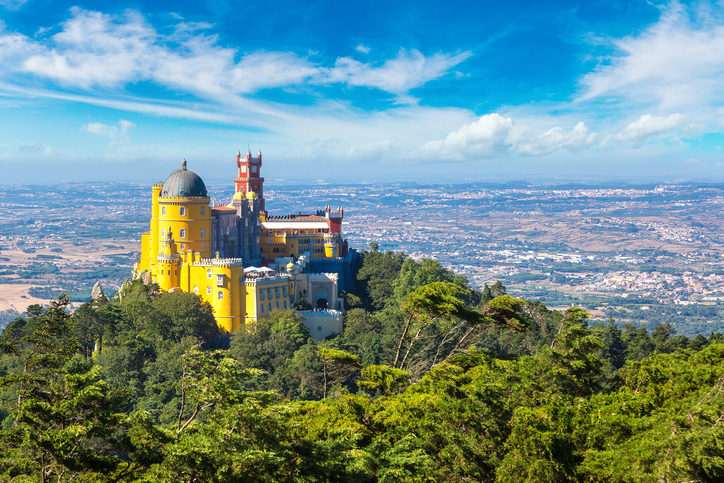
Lisbon’s Castelo de Sao Jorge is a true medieval treat, with gorgeous vistas of Lisbon beyond its fortified walls. You can even purchase skip-the-line tickets ahead of time.
The stunning Pena National Palace in nearby Sintra will blow any predispositions of palaces you’ve ever had into the dust. This picture-perfect example of 19th-century Romanticism architecture will amaze and delight, thanks to its colorful and elaborate facades — not to mention the breathtaking views of the Portuguese countryside. As we mentioned above, private tours leaving from Lisbon are available to visit sites like Sintra and beyond with Easy Going Portugal.
RELATED: 15 Beautiful Castles to See Across Europe
Enjoy a Fado Performance
Immerse yourself in the heartfelt and deeply emotive sounds of Fado, Portugal’s captivating traditional music, during your visit to Lisbon. This soul-stirring genre is an essential part of Portuguese culture, and attending a live performance in the historic neighborhoods of Alfama or Mouraria is a truly unforgettable experience. As the mournful melodies and poignant lyrics fill the air, you’ll find yourself transported to the very essence of the Portuguese soul, evoking a sense of longing, love, and loss known as “saudade.”
Many intimate venues, known as “casas de fado,” offer the opportunity to not only listen to Fado but also to enjoy delicious local cuisine in a cozy, candlelit atmosphere. As the talented singers, or “fadistas,” pour their emotions into each performance, accompanied by the melancholic sounds of the Portuguese guitar, you’ll be mesmerized by the raw, authentic beauty of this enchanting music. A Fado performance is an experience that will remain etched in your memory long after your visit to Lisbon, providing a lasting connection to the heart and spirit of Portugal.
There are plenty of affordable Fado shows that can be booked ahead of your trip throughout Lisbon. We highly recommend scheduling a show accompanied by traditional cuisine over a candlelit dinner.
Ride the 28 Tram
For the classic yellow vintage tram riding experience, take the number 28 which cruises between Martim Moniz and Campo do Ourique. The tram gets especially crowded in the summer, so consider riding it during off-peak times. If you get on at the first stop, Martim Moniz, you’ll deal with fewer lines, riding all the way up the hills to Campo do Ourique. Then, you can do the same route walking down. If you really want to avoid the crowds, brave the hilly walk up, and plan to take the tram down in the opposite direction.
Leisurely Explore the Alfama
The Alfama district is the oldest in Lisbon. Getting lost in its labyrinth of cobblestone streets is a real adventure. Admire churches, tiled buildings and panoramic views as you squeeze through narrow passageways and quaint alleyways. Put your map away and wander — you’ll discover all kinds of beauty you never knew existed. If you can’t manage the hilly streets on foot, explore via electric bike instead.
RECOMMENDED: Rent an E-Bike from Boost Portugal and Do a Self-Guided Tour of Lisbon’s Neighborhoods
Hit The Beach
It’s easy to get to some of Portugal’s most glorious beaches on public transport from Lisbon. Head to the golden sands of Adraga after seeing the sights of Sintra. Cascais and Estoril are among the easiest (15 minutes away) and most popular to get to from Lisbon, and will be crowded with locals and tourists when it’s warm and sunny.
For a quieter experience, explore the beaches and rocky cliffs of the Arrábida Natural Park, about an hour outside of the city. Kayak day trips and secret beaches to explore can be scheduled ahead of time. You can even arrange a scuba diving trip for the day off the coast of Arrábida Natural Park.
RELATED: 10 Unique & Amazing Things To Do in Porto, Portugal
Take the Santa Justa Elevator
The Santa Justa lift (also known as the Carmo lift) isn’t just any elevator. It’s a tourist attraction in itself. The iron lift takes you from the lower Baixa district to the higher area of Carmo so you can avoid the hilly walk. The 19th-century attraction is a sight in itself, covered in geometric, neo-gothic patterns and arches on the outside. Although the elevator is actually part of Lisbon’s public transport network, you can also enjoy city views from the viewing platform. But get ready for long waits, as the platform can only hold 29 people at once (the same as the elevator).
RELATED: 7 Tips to Plan Your Dream Wine Country Honeymoon
Roofless Ruins
One of Lisbon’s most interesting attractions is the roofless convent and church, the Carmo Convent. The walls and columns of the church are still intact, but a 1755 earthquake destroyed the roof. There’s something mystical about walking through the roofless Gothic ruins — and you can even explore the archaeological museum, which has items from various periods of Portuguese history.
Admire the Azulejos
Azulejos is the local name for the colorful ceramic tiles that make up an important part of the city’s vast history. The tiles became fashionable after a Portuguese king visited Spain in the 13th century and saw the tiles that the Moors had brought from Africa. The tiles grew in popularity throughout the exploration age and are still used today to decorate and bring color to homes, buildings, fountains, flooring, benches and more all over Lisbon. Tiles cover the city, some faded and crumbling, some bright and contemporary, each with its own charm. A trip to Lisbon’s National Tile Museum is a treat for anyone truly interested in the history of the colorful ceramics.
Hit Up the Markets
Check out both local and international foods at the Mercado da Ribeira (also known as Time Out Market Lisbon). The market dates back to 1892, but has been recently taken over by Time Out Lisboa in an attempt to modernize its offerings and attract local and foreign clientele.
It’s the perfect way to sample various Portuguese cuisine, like wines and cheeses, typical codfish and seafood, pastries and more. If it’s vintage treasures you’re after, bring those bargaining skills to the test at the Feira da Ladra, where you can find all sorts of antiques and artifacts on Tuesdays and Saturdays.
Drink Vinho Verde
Although Vinho Verde comes from northern Spain, it’s commonly consumed throughout all of Portugal and in Lisbon. The name, which translates to ‘green wine,’ refers to the fact that it’s a young wine, released just a few months after the grapes are harvested. As a result, Vinho Verde is typically light and fresh, with a slight sparkle. Although 86% of Vinho Verde is white, you can also drink it versions of both red and rosé.
Visit the LX Factory
Located in the Alcântara district of Lisbon, LX Factory is a captivating cultural and artistic hub that has transformed a once-abandoned industrial complex into a thriving creative space. As you stroll through its lively streets, you’ll be immersed in a vibrant atmosphere where art, fashion, design, and gastronomy come together in perfect harmony.
With an eclectic mix of unique shops, innovative galleries, and cozy cafes, LX Factory offers a true feast for the senses. In addition to the various shops and galleries, you’ll find an array of trendy restaurants and bars serving up delicious local and international cuisine, making it the perfect spot to unwind after a day of exploring. The urban, industrial charm of LX Factory is further enhanced by the colorful street art that adorns its walls, creating a dynamic backdrop for the many events and performances that take place throughout the year.
Explore the Oceanário de Lisboa
A visit to Lisbon wouldn’t be complete without delving into the mesmerizing underwater world of Oceanário de Lisboa, one of the most remarkable and expansive aquariums in all of Europe. As you wander through its captivating exhibits, you’ll be transported to different aquatic environments, allowing you to encounter a stunning array of marine life from around the globe. From the enchanting grace of sea turtles to the vibrant colors of tropical fish, the Oceanário de Lisboa offers an unforgettable experience for visitors of all ages. Designed with a commitment to conservation and education, the aquarium not only entertains but also inspires a deeper understanding of the world’s oceans and their delicate ecosystems. Make sure to set aside ample time to explore this incredible attraction during your stay in Lisbon, as it promises to leave a lasting impression on your heart and mind.
Stroll through the Jardim Botânico
Take a leisurely stroll through the serene Jardim Botânico, a lush oasis nestled in the heart of Lisbon, where you can escape the bustling city and reconnect with nature. This enchanting botanical garden is a verdant haven that boasts a remarkable variety of plant species from all corners of the globe. As you meander along its winding paths, you’ll be delighted by the fragrant scents and vibrant colors that surround you. The Jardim Botânico is the perfect place to unwind, offering a tranquil and picturesque setting for a leisurely walk, quiet reflection, or a leisurely picnic.
Visit the Calouste Gulbenkian Museum
The Calouste Gulbenkian Museum is a true gem in Lisbon, housing an exceptional art collection that spans various eras and regions, from ancient Egypt to modern Europe. As you explore the museum, you’ll be captivated by the diverse array of masterpieces, including paintings, sculptures, textiles, and decorative arts, all carefully curated from the private collection of the philanthropist Calouste Gulbenkian.
Each section of the museum tells a unique story, taking you on a fascinating journey through art history. Highlights include works by renowned artists such as Rembrandt, Monet, and Turner, as well as exquisite pieces of Islamic art, Greco-Roman sculptures, and stunning examples of Lalique jewelry. The museum’s tranquil gardens, with their picturesque ponds and lush greenery, offer a peaceful retreat from the city and a perfect backdrop for a leisurely stroll.
Discover the Carmo Convent
The Carmo Convent, or Convento do Carmo, stands as a hauntingly beautiful reminder of Lisbon’s past, its Gothic ruins bearing witness to the devastating 1755 earthquake that forever changed the city. As you wander through the skeletal remains of this once-magnificent church, you’ll be struck by the striking contrast between the surviving arches and the open sky above, a testament to the power of nature and the passage of time.
Today, the Carmo Convent is home to an intriguing archaeological museum that invites you to delve deeper into Portugal’s rich history. The museum features an eclectic collection of artifacts spanning various time periods, from prehistoric to medieval, including ancient tombstones, Roman mosaics, and even a couple of mummies. The museum also showcases items that were discovered amidst the rubble following the earthquake, offering a poignant glimpse into the lives of those who experienced the cataclysmic event.
Take in the view at Miradouro da Senhora do Monte
Miradouro da Senhora do Monte, perched atop one of Lisbon’s highest hills, offers an unbeatable vantage point for taking in the breathtaking panorama of the city. As you gaze out over the picturesque landscape, you’ll be treated to a stunning view that encompasses historic neighborhoods, iconic landmarks, and the sparkling Tagus River, all framed by a vast expanse of sky.
This scenic overlook is an idyllic spot for capturing memorable photographs, watching the sunset, or simply taking a moment to soak in the beauty of Lisbon. The peaceful atmosphere is further enhanced by the small chapel of Senhora do Monte, which lends a touch of charm and tranquility to the setting.
Whether you choose to walk up the steep, winding streets or take a more leisurely approach via public transport, a visit to Miradouro da Senhora do Monte is a must during your time in Lisbon.
Top Neighborhoods in Lisbon for Wine & Food
Lisbon offers a diverse culinary scene that caters to food and wine lovers. To make the city a bit easier to navigate, here are some of the top neighborhoods in Lisbon that are currently known for their above-par wine and food establishments.
Bairro Alto
A vibrant and bohemian district, Bairro Alto is known for its lively nightlife and a wide range of restaurants, tapas bars, and traditional “tascas” serving Portuguese dishes. This neighborhood also offers numerous wine bars and Fado houses.
Alfama
The oldest neighborhood in Lisbon, Alfama is famous for its narrow streets, Fado music venues, and authentic Portuguese restaurants offering local dishes like grilled sardines and bacalhau.
Chiado
An elegant and upscale area, Chiado is home to many fine-dining establishments, trendy cafes, and traditional pastry shops. You’ll also find wine bars and gourmet food shops in this neighborhood.
Príncipe Real
Known for its beautiful gardens and stylish atmosphere, Príncipe Real offers a mix of trendy restaurants, cafes, and bars, with a focus on creative cuisine and unique gastronomic experiences.
Cais do Sodré
Once a seedy waterfront district, Cais do Sodré has transformed into a bustling area with a variety of dining options, including the popular Time Out Market, which features food stalls from some of Lisbon’s top chefs.
Mouraria
A melting pot of cultures, Mouraria is a great neighborhood to explore for those looking to sample diverse cuisines, ranging from traditional Portuguese fare to Indian, African, and Asian flavors.
Belém
As we mentioned before, Belém is home to the famous Pastéis de Belém bakery. This historic district offers a range of restaurants and cafes, with many establishments focusing on seafood and traditional Portuguese dishes.
Lx Factory
Situated in the Alcântara district, Lx Factory is an artistic and cultural hub with an array of unique dining options, ranging from casual eateries and food trucks to upscale restaurants and trendy bars.
Parque das Nações
A modern neighborhood built for the 1998 World Exposition, Parque das Nações offers a variety of dining options, including contemporary Portuguese cuisine, international fare, and several wine bars.
Campo de Ourique
A residential neighborhood with a strong sense of community, Campo de Ourique is home to a thriving food market, Mercado de Campo de Ourique, and a variety of cafes, restaurants, and wine bars catering to locals and visitors alike.
How to Get to Lisbon
Lisbon is well-connected to major cities around the world, making it relatively easy to reach.
Flights
The main international gateway to Lisbon is the Humberto Delgado Airport (LIS), also known as Lisbon Airport or Portela Airport. It is located about 7 kilometers (4.3 miles) northeast of the city center. Check and compare current flight prices into Lisbon from your origination airport right here.
Once you’ve arrived at Lisbon Airport, there are several transportation options to reach the city center and beyond:
Metro
The most cost-effective and convenient option, the Lisbon Metro’s Red Line (Linha Vermelha) connects the airport to the city center. The journey takes about 20-25 minutes, and you’ll need to purchase a Viva Viagem card, which can be reloaded for future trips on public transportation.
Aerobus
A shuttle bus service that connects the airport to various key points in the city, including major hotels and transportation hubs. Tickets can be purchased on board or online, and the service operates from 8 am to 9 pm daily.
Taxis and Rideshares
Taxis and rideshare services like Uber and Bolt are available at the airport. The journey to the city center takes around 15-25 minutes, depending on traffic. Keep in mind that taxis in Lisbon charge extra for luggage.
Car Rentals
Several car rental companies have offices at the airport if you prefer to drive. Be aware that parking in Lisbon can be challenging, and the city’s narrow streets may be difficult to navigate for inexperienced drivers.
Upscale Hotel Recommendations in Lisbon
A variety of upscale hotels cater to discerning travelers seeking luxury and comfort. These establishments not only offer lavish accommodations, but also prime locations, exceptional service, and world-class amenities. The Four Seasons Hotel Ritz Lisbon, located near the historic city center, boasts stunning views, a rooftop fitness center, and a luxurious spa. Similarly, the Pestana Palace Lisboa, set in a beautifully restored 19th-century palace, offers opulent rooms, lush gardens, and a refined dining experience. For contemporary design and elegance, consider staying at the Altis Belém Hotel & Spa, which is situated near the Tagus River and the iconic Belém Tower.
Private & Guided Tours of Lisbon
If you’re like us at Winetraveler, we’re always trying to limit worrying about logistics by leveraging local knowledge. Below, we’ve included some of our favorite private and guided tours that will give you an insider’s perspective of the city and make your trip more enjoyable.
Lisbon Half Day Private Tour operated by Gold Compass

Enjoy a 4-hour private tour in Lisbon tailored to your interests, complete with hotel or port transfers. Collaborate with your knowledgeable driver to create the perfect itinerary, immersing yourself in Portuguese history and culture. Explore the charming Alfama district, admire panoramic views from a hilltop castle, visit the scenic Belém coast and its UNESCO-recognized monastery, or discover the best spots for Portugal’s famous egg tarts. Choose a morning or afternoon departure for this customizable Lisbon experience.
Private Tour Around Lisbon by Tuk Tuk
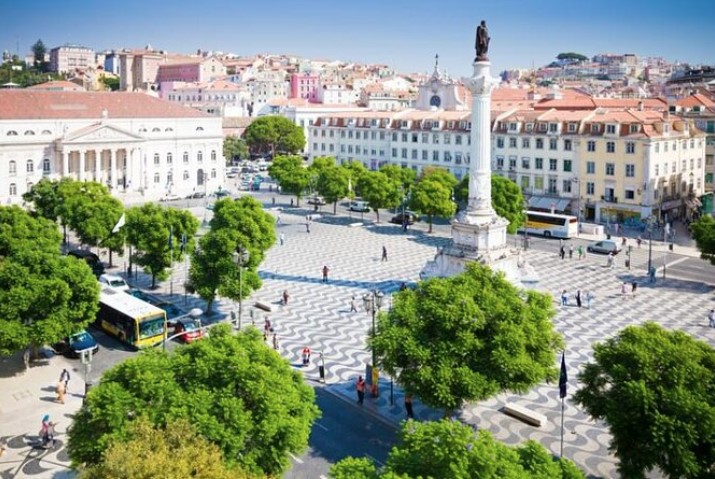
Discover the heart of Lisbon with our best-selling private 1hr 30min to 2hr tour aboard a Tuk-Tuk or Buggy, guided by a local expert. Experienced drivers ensure a memorable experience, making Lisbon feel like home and capturing your heart.
This tour offers privileged access to Lisbon’s diverse sights, from breathtaking viewpoints and rooftops to museums and unique neighborhoods. Explore Chiado, Largo do Carmo, São Pedro de Alcântara, Park Eduardo VII, Bairro Alto, Sé de Lisboa, Miradouros Santa Luzia and Portas do Sol, São Vicente de Fora, National Pantheon, Alfama, Praça do Comércio, Feira da Ladra Flea Market, and more.
Private Lisbon Food & Wine Tour with Filipa
Experience the essence of a country, its culture, and people by exploring their flavors, genuine products, and history. Join us for a 4-hour journey through Lisbon, where your guide will share new perspectives of Lisbon while walking the city streets.
Starting at $161.92, immerse yourself in the city’s unique identity through its flavors and traditions. From sweets and cheeses to wine and liquor, discover a vast world of flavors. Food is about sharing feelings, happiness, and enjoying a slower pace of life. Let’s come together to appreciate and celebrate life in Lisbon, a city that always welcomes you with open arms.
Take a Day Trip to the Algarve
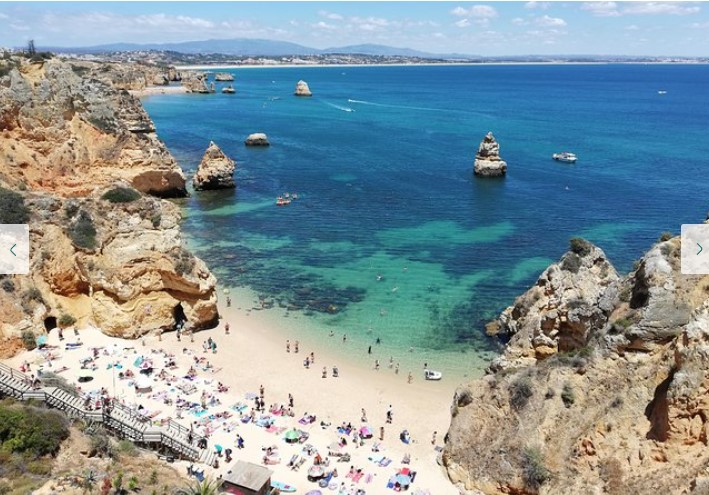
Embark on a private full-day tour exploring the western Algarve, between Sagres and Lagos, and immerse yourself in the region’s stunning beauty.
Starting from Lisbon, take the A2 motorway towards Sagres in the southernmost region of Portugal, approximately a 3-hour journey. Upon arrival, you’ll visit various points of interest in the Algarve, including the Fortress of Sagres, Cape St. Vincent, and Ponta da Piedade, known for its breathtaking beaches and caves. You’ll also explore the historic center of Lagos, its churches, and the famous golden chapel in Santo António church.
This private tour includes an hour-long boat trip to the Ponta da Piedade caves in Lagos. In the evening, you’ll return to Lisbon via the same route, taking around 2.5 hours.
Frequently Asked Questions about Things to Do in Lisbon
You are reading “Best Authentic Things to Do in Lisbon Portugal” Back To Top
what to do in Lisbon, what is Lisbon famous for, Lisbon wineries, wine tasting, things to do near me, activities tours and restaurants in Lisbon: trending travel destinations in Portugal
If you enjoyed this guide, make sure you register to become a Winetraveler for free! You’ll get access to all of our content and interact with other Winetravelers and for travel inspiration around the world. Be sure to follow along with us on Instagram as we continue to feature more exciting destinations.
